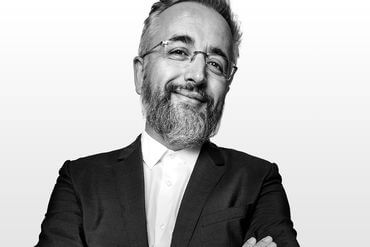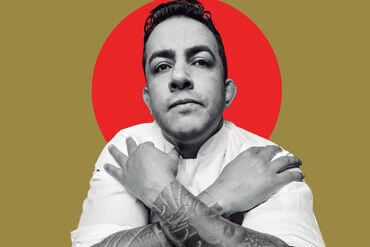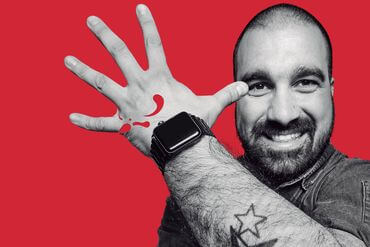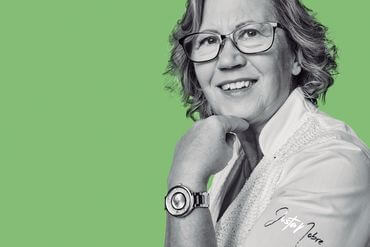
Rubén Valbuena
Óscar Molina, the chef at La Gaia at the Ibiza Gran Hotel, was led by curiosity to contact Rubén Valbuena, the owner of the Cantagrullas dairy which has been chosen by many of our country’s great chefs to create exclusive cheeses for their kitchens. Rubén has revolutionised the art of cheese-making in Spain, and has become a celebrity through, what he describes as “this novel relationship with chefs,” a relationship that has led him to work with almost all Spain’s great contemporary chefs since Óscar Velasco and Abel Valverde of the Santceloni restaurant (two Michelin stars) put their money on him. Since then, Martín Berasategui, Ramón Freixa, Paco Roncero, Óscar Velasco, Nacho Manzano, Pepe Solla and Diego Guerrero, among others, have surrendered to the charms of his cheeses.
During our conversation with Óscar Molina and Rubén Valbuena at the Ibiza Gran Hotel, we discovered that what our cheese-maker likes “even more than cheese is cooking, because making cheese is just like any other sort of cooking.” Perhaps that explains his desire to collaborate with chefs. This collaboration, he declares, “goes much further than simply making money.” “We have to share,” admits Rubén to Óscar. “It would be no use me coming here if I didn’t share with you; I’d be just another supplier to be replaced at any moment,” concludes this scholar who holds a PhD in Geography and who, before setting up his dairy in the Valladolid district of Ataquines, was an adviser to the UN and travelled half the world. Óscar agrees, and adds that “there needs to be enthusiasm and involvement.” “Of course,” agrees Valbuena. “I think there needs to be a reward beyond the purely financial aspect, because at times like that we’re pushing back the limits of the product, and that is what guarantees me long-term work with you, because love has blossomed; there’s no other explanation,” he says, while both men erupt into laughter.

Cheese making
Rubén explains how, once the Cantagrullas dairy had been set up, the ‘Cultivo’ project followed. “When I started out in 2011, I encountered all sorts of problems; I fell at every hurdle, a hundred times perhaps, and I couldn’t understand why other cheese-making operations, faced with the same difficulties, stayed in business. In 2012, I set up a first meeting in Valencia, a second meeting in Madrid and a third in Valladolid, where I brought together the cheese-makers whom I perceived as having some connection with Cantagrullas, whose businesses had the same dynamic, perhaps, or similar concerns, so that we could discuss the problems that it was in all our interests to try to resolve. The discussions in the last meeting led to the idea of setting up Cultivo.” Consequently, Cultivo now brings together nearly 100 dairies (mostly from within Spain, but also some from Portugal, France, the United Kingdom and Holland) in a shared space in Calle Duque, Madrid where, in addition to selling cheeses, workshops are held and a number of other activities organised.
Martín Berasategui, Ramón Freixa, Paco Roncero, Óscar Velasco, Nacho Manzano, Pepe Solla and Diego Guerrero have surrendered to the charms of his cheeses.
Apart from discussing many technical topics, such as the French cheese heritage, analysing cheeses from the various regions of Spain, and even philosophising on cooking and gastronomy, the conversation also finds time to touch on more personal subjects. So we arrive at a point where Óscar asks, “And what about family life because, of course, with so much travelling and so much work…” Rubén’s expression becomes serious, and he replies: “Well that’s the counterbalance, the thing that the Government wanted to bring in a few years back, the goal they slipped through when they were talking about striking a balance between work and family life, something which is very complicated, because you try to achieve that balance, but you never feel that you’ve found it. If you choose the professional path, time goes by and you get the feeling that you are never there at the most important moments while, on the other hand, if you focus on your personal life you see opportunities slip away—and you hate that, and you don’t know what to do for the best. But luckily, I have a fantastic wife, who has a more than 50% role in this project, who supports me, who puts up with all these eccentricities and who often takes charge.” Óscar can be seen smiling in agreement with Rubén’s words. The conversation continued as the two friends went on to have dinner together, and the result of these meetings was a new, exclusive cheese which Óscar included on the menu at La Gaia.
Interview Rubén Valbuena
What do you try to say with the cheeses you make?
It’s not so much what I try to say, as I try to adapt a method to achieve textures that seem to me to contribute something from a gastronomic perspective: it’s more that I try to respect what the milk has to say. What we try to do is to develop more complex flavours, more depth of flavour.
Raw or pasteurised milk?
Cheese made from raw milk conserves the milk’s microbiological make-up, and this makes it more likely that the cheese will have unique characteristics and a distinct identity, whereas a cheese made from pasteurised milk—and this is neither a good thing nor a bad thing—cannot develop character; it’s a question of authenticity. I can replicate a cheese from pasteurised milk anywhere in the world. A cheese made from raw milk can be a good cheese or a bad cheese, but it will have personality because its microbiological development gives it distinct flavours and textures. What raw milk contributes is identity. Making cheese with raw milk is more a philosophy than anything.

Rubén Valbuena cheeses
What other factors affect the cheese?
If we’re talking about milk, then milk from stabled livestock is not the same as milk from a free-range herd. The free-range herd will have a much greater microbiological richness, and will not have the levels of bacteria that negatively affect the development of the cheeses. Using extensively farmed milk, taking advantage of local resources, will always be more interesting. You need to have respect for the animal, a special regime, an extensive one if at all possible, which draws on local resources.
What cheese combinations do you like?
If the cheese can be heated, or used in a recipe, I really like cheese with root vegetables, as in a traditional raclette. I’m also very fond of tartiflette. And I love cheese with a lean meat, with nuts or with dried fruits (apricots, dates, etc.).
What drink goes best with cheese?
Wine, obviously, but especially champagne-type wines and Jerez wines. Wines with personality, like the cheese. Cheese goes very well with cider too, and even with beer, or with spirits, or whisky… Whisky and cheese are fantastic travelling companions.

Cantagrullas farm






